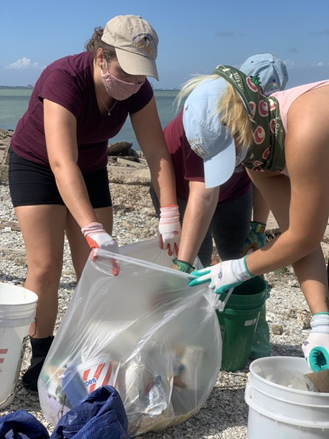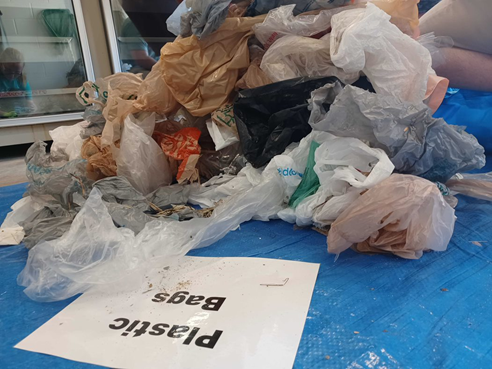'Tis the season to be giving: This Coastal Bend org gives back through beach cleanups

It’s 4 p.m. on a Thursday afternoon in December. A rush of excitement fills me as I load my surfboard into my car and head to J.P. Luby Beach. Upon arriving, I unload my surfboard, plunge myself into the gulf and begin my paddle out toward the cleaner break. Suddenly, my hand brushes something in the water beside me. I look back and cry out prematurely, seeing a white blob just below the surface and assuming I have been stung by a jellyfish of some sort.
Upon closer observation, I simultaneously breathe a sigh of relief and a huff of disgust; the white blob is not a jellyfish, but a white plastic grocery bag bobbing along to the ocean current.
As a surfer, this is not the first time I have encountered this scenario. Thanks to its connection to the Mississippi River, which touches more than 2,000 miles of land and drains more than 50% of the nation’s rivers, the Gulf of Mexico has some of the highest concentrations of marine plastic debris worldwide.
This plastic then mingles with other plastic traveling the Gulf Stream, a swift ocean current that holds origin in the Gulf of Mexico. The Coastal Bend itself is not exempt from contributing to this issue; trash can often accumulate on beaches from failure to clean up after beach excursions, adding to overflowing trash receptacles, or throwing trash in the back of pickup trucks, to name a few.
As a scientist, I am aware that the issue of marine plastic pollution is of higher concern than it would seem. Marine organisms often ingest or are entangled by plastic debris, both of which can lead to death. Furthermore, microplastics are often ingested by fish. Chemicals from this plastic can then bioaccumulate in the tissue of the fish which, when ingested by humans, can cause a myriad of issues such as liver damage, immune system damage, and even cancer.

I am, therefore, grateful for organizations that make an effort to mitigate the issue of marine plastic pollution. Among these is the Bahr Marine Ecology Lab at Texas A&M University-Corpus Christi. The BMEL was started by Dr. Keisha Bahr in 2019. While primarily a research lab investigating human impacts on marine calcifying organisms, the mission of the BMEL is also “to conserve our marine resources through education, restoration, and research”.
To further support this mission and create a connection with the community, the BMEL started a beach-cleanup initiative dubbed “Solutions to Pollution.”
“Students learn about our marine resources’ value and how to better protect them but may feel disconnected that they can do something about these problems,” Bahr shares. “We started our environmental awareness initiative to show our students and community that no problem is too small and that we can act locally to help address global problems.”
The initiative was started in fall of 2020 and quickly gained traction. What started as a few college students picking up trash on the TAMU-CC campus beach has turned into monthly beach cleanups, trash audits, and “adoption” of the beach through the Texas General Land Office Adopt-A-Beach Program. Once a month, a flyer is circulated on the BMEL Instagram and Twitter accounts, inviting students and community members alike to join the BMEL crew for their beach clean. The trash is then separated by type and weighed, counted, and recorded before being properly disposed of.
At the end of the year, the monthly data is compiled into an audit report that is shared with the TAMU-CC Environmental Committee, Islander Green Team, Surfrider Foundation, and Rookery Island Clean-ups, among others. Over the past two years, this initiative has resulted in the collection of nearly 500 pounds of trash.
Eleanor Tenbrink, the current BMEL student leading these cleanups, shares this about the importance of the cleanups: “The beaches in the Coastal Bend have both monetary and intrinsic value but increases in plastic pollution threaten these ecosystems and the resources they provide. Conducting these cleanups allows us to raise awareness about the severity of plastic pollution in our area and inform the local government to increase policies against plastics to better protect our beaches.”
As a surfer, scientist, and steward of the environment, I am incredibly grateful to be part of such an organization as BMEL. This holiday season, I encourage everyone to give back to our beaches by conducting your own cleanups and opting for alternatives to single-use plastics. After all, as environmental advocate Robert Swan so correctly stated, “The greatest threat to our planet is the belief that someone else will save it.”
Zoe Ruben is a master’s student in marine biology with a focus in coral reef ecology at Texas A&M University-Corpus Christi. She earned her Bachelor’s degree in environmental science with a concentration in marine and coastal resources and a minor in technical and professional writing from Texas A&M University-Corpus Christi in 2020. Her freelance environmental journalism work can be found in "Environmental Coastal & Offshore Magazine," "Reef Encounter," and "Reefbites," among others.
This article originally appeared on Corpus Christi Caller Times: This Coastal Bend organization gives back through beach cleanups
